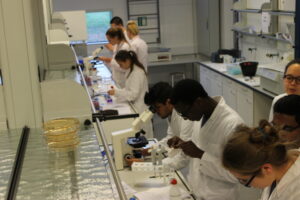Molecular analysis of adaptation processes in plant pathogenic bacteria in response to temperature changes:
– differential gene expression in response to temperature changes;
– regulation of gene expression in bacteria;
– molecular dissection of temperature sensing in bacteria;
– in-depth analysis of a model two-component regulatory system;
– DNA array technology
– changes in membrane fluidity, temperature-responsive incorporation of proteins in the bacterial membranes;
– general microbial physiology under varying physiological conditions;
– temperature-dependent synthesis of secondary metabolites in bacteria;
– regulation of export and secretion of proteins in plant pathogens;
– exopolysaccharide biosynthesis and function;
– comparison of thermo-regulated gene expression in pathogens of animals and plants;
– model system: Pseudomonas syringae and the phytotoxin coronatine.
Molecular and genetic analysis of multi-drug efflux systems in plant-associated bacteria:
– genetic analysis of multidrug efflux (MDE) systems in Erwinia amylovora
– MATE and RND-type efflux pumps and their mode of action
– Disposal of plant-borne toxic compounds as a virulence mechanism
– Antagonistic activities between E. amylovora and Panthoea agglomerans
– Peptide-based antimicrobial compounds and their secretion by bacteria
– Biophysical analysis and natural functions of MDE pumps
– Analysis of transcriptional regulation of MDE systems, regulatory cascades
– Genome-wide coordination of MDE expression
Molecular interactions of plant pathogenic bacteria with host and non-host plants:
– mechanisms of infection, epiphytic fitness of phytopathogens on plant surfaces;
– complete nucleotide sequencing of a 90-kb virulence plasmid from Pseudomonas syringae (identification of pathogenicity islands PAI);
– ethylene biosynthesis in phytopathogenic bacteria;
– identification of novel virulence factors and mechanisms, respectively;
– hypersensitive reaction on non-host plants;
– detoxification of plant-borne defense compounds by pathogenic bacteria;
– octadecanoid signalling pathways (jasmonic acid), metabolism of octadecanoids;
– signal perception and transduction during invasion processes;
– early stages of infection, prevention of plant recognition of pathogens.
Biotechnological applications of thermo-regulated gene expression:
– generation of expression vectors or cassettes for temperature-mediated protein synthesis or overproduction;
– detoxification processes (degradation of anti-microbial plant compounds by enzymes of plant pathogens);
– epiphytic survival strategies of biocontrol bacteria (UV tolerance, capsule formation, plasmid transfer);
– biofilm production and prevention in medical, food-based, and other settings.
Molecular analysis of marine diatom-bacteria interactions:
– establishing a molecular model system for the investigation of cell-to-cell interactions in marine settings
– transparent exopolymeric particles
– molecular signaling of interactions between heterotrophic marine bacteria and their photosynthetic eukaryotic hosts

